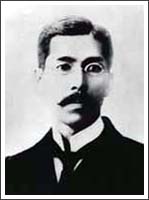Takayama Chogyū
| Takayama Chogyū | |
|---|---|

Takayama Chogyū
|
|
| Born |
28 February 1871 Tsuruoka, Yamagata, Japan |
| Died | 24 December 1902 (aged 31) Chigasaki, Kanagawa, Japan |
| Occupation | Writer |
| Genre | novels, art history, Buddhist philosophy |
Takayama Chogyū (高山 樗牛?, 28 February 1871 – 24 December 1902), real name Takayama Rinjirō, was the pen name of a Japanese author and literary critic. He influenced Japanese literature in the late Meiji period with his blend of romantic individualism, concepts of self-realization, aesthetics, and nationalism. However, many of Chogyū's works seem cryptic to readers today, due to the archaic style he employed.
Chogyū was born in what is now the city of Tsuruoka in Yamagata Prefecture. His father was a minor samurai of the Shōnai Domain, who found employment with the police after the Meiji Restoration. At the age of two he was adopted by his aunt's family.
In 1887 he entered high school in Sendai, where he excelled in English language and English literature. While studying philosophy at Tokyo Imperial University, he was influenced by Thomas Hill Green's concepts of self-realization and nationalism.
Chogyū entered and won a fiction contest sponsored by Yomiuri Shimbun newspaper for his semi-historical romance, Takiguchi Nyūdō. It was his first, and only, novel. While still a student, he co-founded the literary journal Teikoku Bungaku (“Imperial Literature”) and submitted articles to the literary magazine, Taiyō (“Sun”), of which he later became senior editor. He also changed his official residence to Hokkaidō to avoid military conscription.
...
Wikipedia
